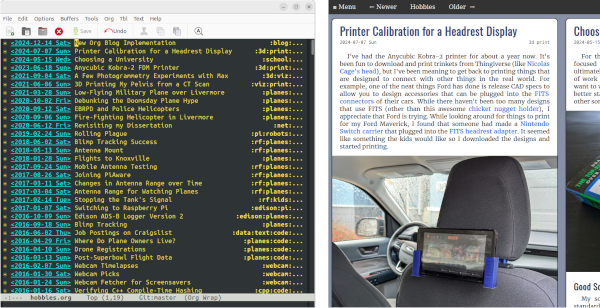New Org Blog Implementation
If everything is working right, you should be seeing this website rendered with a new backend that I've had on the back burner for a few years now. It's still missing some features, but I decided to switch over to it so I can move on to other projects. It's written in C++ this time, but still uses Emacs Org mode files for the content.

Evolution
Over the last 20+ years or I've implemented my website in a few different ways. Back in the 1990's I wrote a few web pages in HTML to talk about the things I was doing in college. HTML was tedious so I wrote some Perl scripts to generate static web pages from plain text files. Writing in plain text really helped speed up the writing, but after a few dozen posts it became a chore to regenerate and upload the content whenever there was a change. The next step was to port the Perl script over to a cgi script that could generate the pages on demand. While people scoff at it now, Perl was a pretty decent language for generating html because it was straightforward to hack together a bunch of regexs to convert chunks of text into HTML templates. It was hard to re-read the code and make sense of it, but since it was an interpreted language you could just iterate on it until things looked right.
The next big step for me was to reformat all the text content into an Emacs Org-mode file. Org mode made it easy to put each post as its own section in a single-file outline. Merging everything into one file meant I could insert extra posts into the timeline without having to renumber everything. Plus, the Emacs spell checker has been great, when I remember to run it. I updated the Perl cgi script to read from the org file and dump it to HTML. Looking back through my posts, I see I made that change 10 years ago.
Needing to Change
The Perl version of this website was ok, but a few things bugged me. First, the HTML looked a little old and didn't do the CSS magic to make the site readable on smaller devices. It was pretty awful on a cell phone because it would shrink several a wide desktop display of content down to a narrow device. Also, Google said at some point that pages that were missing a proper viewport tag (like mine) would be pushed down in their search results. Second, I noticed that generating my webpages with Perl took longer than I wanted. It could have just been the cheap webhosting plan I'd been using, but I suspected that all those complicated regexs I'd written were adding up. Finally, I wanted to do more things with the website but I don't write anything in Perl anymore.
So why C++? Most of my coding these days is in C++ so I had a good idea of how to split the code up into useful classes and implement some of the harder things like string formatting. The main hardship of going with C++ is that you have to recompile the code every time you make a major change. It took a while before I found the right balance in the code. Initially I went all-in on jamming everything except the org-mode content into C++. I wasted a lot of time working out clever ways to have CMake generate custom header files with constants for the different sites I wanted to run (ie, devel at home and production on the site). I later came to my senses and switched to a system that has hooks to read in a template file at runtime, so I could change the look of the website without having to recompile everything.
Changes
I don't think the site looks too different, but there are some changes:
- Quicker: I haven't done any speed testing, but the site feels a lot peppier now.
- Mobile Friendly: Things should look ok on a cell phone now. The new CSS should just scroll vertically and be readable.
- Simple Header: I'm still doing a horizontal scroller, but I've shrunk the navigation controls to a command bar.
- Separation of Content: Someone suggested that I split the site content so that it was clear what I do for work and what I do in my personal time. The new software made it easy to run each one as its own blog, so I created a "Publications" section and a "Hobbies" section.
- Longer URLs: Sadly, I had to break the way I was linking to posts. One problem was that since there wasn't a date in the previous version of the URLs, I couldn't have the same title more than once. Changing URLs was a sin in the old web, but seriously, how many people linked here anyways?
There's still a lot missing (eg index and tags pages), but it's good enough that I've switched things over. If you can't find a page you're looking for, flip around some and use the date to find the new post.